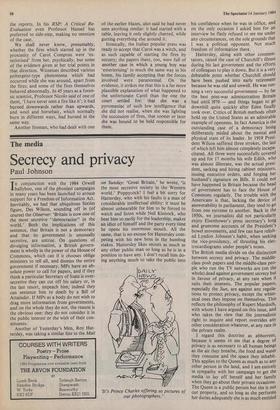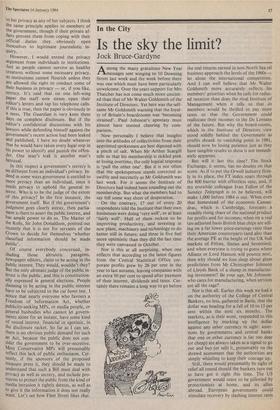The media
Secrecy and privacy
Paul Johnson
In conjunction with the 1984 Orwell ballyhoo, one of the phoniest campaigns in many years has been launched to arouse support for a Freedom of Information Act. Inevitably, we had that ubiquitous Sixties figure, Des Wilson, sounding off in (of course) the Observer: 'Britain is now one of the most secretive "democracies" in the world.' Both the implications of this sentence, that Britain is not a democracy and that its government is unusually secretive, are untrue. On questions of divulging information, a British govern- ment is wholly in the power of the House of Commons, which can if it chooses oblige ministers to tell all, and dismiss the entire government if necessary. MPs have an ab- solute power to call for papers, and if they think a particular Secretary of State is over- secretive they can cut off his salary or, in the last resort, impeach him; indeed they can sentence him to death by a Bill of Attainder. If MPs as a body do not wish to drag more information from governments, and on the whole they do not, the reason is the obvious one: they do not consider it in the public interest or the wish of their con- stituents.
Another of Yesterday's Men, Roy Hat- tersley, was taking a similar line in the Mail on Sunday: 'Great Britain,' he wrote, 'is the most secretive society in the Western world.' Poppycock! I feel a bit sorry for Hattersley, who with his faults is a man of considerable intellectual ability: it must be almost unbearable for him to be forced to watch and listen while Neil Kinnock, who beat him so easily for the leadership, makes an idiot of himself and the party every time he opens his enormous mouth. All the same, that is no excuse for Hattersley com- peting with his new boss in the humbug stakes. Hattersley likes secrets as much as any other public man so long as he is in a position to have any. I don't recall him do- ing anything much to take the public into `It's Prince Charles offering us pictures of our photographers.' his confidence when he was in office, and on the only occasion I asked him for an interview he flatly refused to see me under any circumstances, on the sole grounds that I was a political opponent. Not much freedom of information there.
Hattersley, along with other commen- tators, raised the case of Churchill's illness during his last government and the efforts of colleagues to play it down. But it is a very debatable point whether Churchill should have been pushed into early retirement because he was old and unwell. He was run- ning a very successful government — by far the best post-war administration Britain had until 1979 — and things began to go downhill quite quickly after Eden finally took over. Critics of British methods often hold up the United States as an admirable example of openness. In fact America is the outstanding case of a democracy being deliberately misled about the mental and physical state of its leader. In 1919 Presi- dent Wilson suffered three strokes, the last of which left him almost completely incapa- citated. All three were successfully covered up and for 17 months his wife Edith, who was almost illiterate, was the actual presi- dent, sacking and hiring cabinet ministers, issuing executive orders, and forging her husband's signature on Bills. It could not have happened in Britain because the head of government has to face the House of Commons regularly. The trouble with the Americans is that, lacking the device of answerability in parliament, they tend to go from one extreme to another. Back in the 1950s, we journalists did not particularly enjoy Eisenhower's press secretary's long and gruesome accounts of the President's bowel movements, and few can have relish- ed Lyndon Johnson's habit, when seeking the vice-presidency, of thrusting his elec- trocardiograms under people's noses.
The British media divide on the distinction between secrecy and privacy. The middle- class posh papers and the middle-class peo- ple who run the TV networks are (on the whole) dead against government secrecy but in favour of privacy, at any rate when it suits their interests. The popular papers, especially the Sun, are against any regula- tions to protect privacy, except the whim- sical ones they impose on themselves. This reflects the philosophy of Rupert Murdoch, with whom I have argued on this issue, and who takes the view that the journalistic right to inquire and report overrides any other consideration whatever, at any rate in the private realm.
I regard this doctrine as abhorrent, because it seems to me that a degree of privacy is as necessary to all human beings as the air they breathe, the food and water they consume and the space they inhabit. This applies to the Queen as much as to any other person in the land, and I am entirely in sympathy with her campaign to get the media to lay off herself and her family when they go about their private occasions. The Queen is a public person but she is not our property, and so long as she performs her duties adequately she is as much entitled to her privacy as any of her subjects. I think the same principle applies to members of the government, though if their private af- fairs prevent them from coping with their official duties they obviously open themselves to legitimate journalistic in- quiry.
However, I would extend the privacy argument from individuals to institutions. Just as people cannot survive as healthy creatures without some necessary privacy, so institutions cannot flourish unless they are allowed the right to conduct some of their business in privacy — or, if you like, secrecy. It's said that on one left-wing Paper the staff now steam open their editor's letters and tap his telephone calls. If this is true, then the paper is obviously in a mess. The Guardian is very keen these days on complete disclosure. But if the editor's confidential discussions with his lawyers while defending himself against the government's recent action had been leaked and published, 1 have no doubt whatever that he would have taken every legal step in his power to identify and punish the offen- der. One man's leak is another man's betrayal.
In this respect a government's secrecy is no different from an individual's privacy. In- deed in some ways government is entitled to more privacy than an individual, since it needs privacy to uphold the general in- terest. Who is to be the judge of the extent of this privacy? In the first instance, the government itself. But if the government's Judgment goes clearly astray, then parlia- ment is there to assert the public interest, and has ample power to do so. The Master of the Rolls, Sir John Donaldson, pointed out recently that it is not for servants of the Crown to decide for themselves 'whether classified information should be made Public'.
Of course everybody concerned, in-
cluding those altruistic paragons, newspaper editors, claim to be acting in the Public interest. They would, wouldn't they? But the only ultimate judge of the public in- terest is the public, and this is constitution- ally expressed in general elections. People claiming to be acting in the public interest have to be subjected to the cui Bono test. I notice that nearly everyone who favours a Freedom of Information Act, whether Publicity-seeking MPs, or media people, or general busbodies who cannot let govern- ments alone for an instant, have some kind of vested interest, financial or egotistic, in the disclosure racket. So far as I can see, there is no obvious public demand for such an Act, because the public does not con- sider the government to be over-secretive. Most Conservative MPs will presumably reflect this lack of public enthusiasm. Cer- tainly, if the sponsors of the proposed measure press it, they should be made to understand that such a Bill must deal with privacy as well as secrecy, and include pro- visions to protect the public from the kind of media intrusion it rightly detests, as well as to give it the information it does not really want. Let's see how Fleet Street likes that.







































 Previous page
Previous page